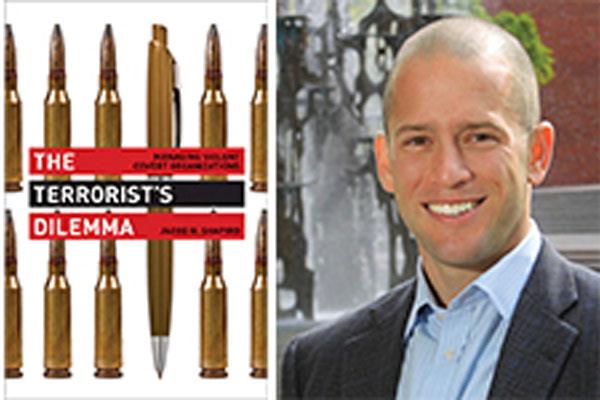Shapiro Wins Furniss Book Award for ‘The Terrorist’s Dilemma’

How do terrorist groups control their members? Do the tools groups use to monitor their operatives and enforce discipline create security vulnerabilities that governments can exploit?
Jacob N. Shapiro, associate professor of politics and international affairs at Princeton University, answers these questions and more in The Terrorist’s Dilemma: Managing Violent Covert Organizations (Princeton University Press, 2013), winner of the Mershon Center’s Edgar S. Furniss Book Award.
The winning author receives a cash grant and is invited to speak about the book at Mershon Center. Shapiro will speak at 12:30 p.m. Tuesday, October 13, 2015. Read more and register at go.osu.edu/shapiroj.
The Furniss Award commemorates the founding director of the Mershon Center, Edgar S. Furniss, and is given annually to an author whose first book makes an exceptional contribution to the study of national and international security. Previous winners include John Mearsheimer, Barry Posen, and Stephen Walt.
The Terrorist's Dilemma is the first book to systematically examine the great variation in how terrorist groups are structured. Employing a broad range of agency theory, historical case studies, and terrorists' own internal documents, Shapiro discusses the core managerial challenges that terrorists face and illustrates how their political goals interact with the operational environment to push them to organize in particular ways.
Shapiro provides a historically informed explanation for why some groups have little hierarchy, while others resemble miniature firms, complete with line charts and written disciplinary codes. Looking at groups in Africa, Asia, Europe, and North America, he highlights how consistent and widespread the terrorist's dilemma -- balancing the desire to maintain control with the need for secrecy -- has been since the 1880s.
Through an analysis of more than 100 terrorist autobiographies he shows how prevalent bureaucracy has been, and he utilizes a cache of internal documents from al Qaeda in Iraq to outline why this deadly group used so much paperwork to handle its people.
Tracing the strategic interaction between terrorist leaders and their operatives, Shapiro closes with a series of comparative case studies, indicating that the differences in how groups in the same conflict approach their dilemmas are consistent with an agency theory perspective.
Shapiro’s active research projects at Princeton study political violence, economic and political development in conflict zones, security policy, and urban conflict. He co-directs the Empirical Studies of Conflict Project. His research has been published or is forthcoming in broad range of academic and policy journals including American Journal of Political Science, Foreign Affairs, Foreign Policy, International Organization, International Security, Journal of Political Economy, and World Politics as well as a number of edited volumes. The Terrorist’s Dilemma is his first book.
Shapiro is a term member of the Council on Foreign Relations, an associate editor of World Politics, a faculty fellow of the Association for Analytic Learning about Islam and Muslim Societies, a research fellow at the Center for Economic Research in Pakistan, an associate fellow of the Institute of Development and Economic Alternatives, and served in the U.S. Navy and Naval Reserve.
He holds a Ph.D. in political science from Stanford University.
